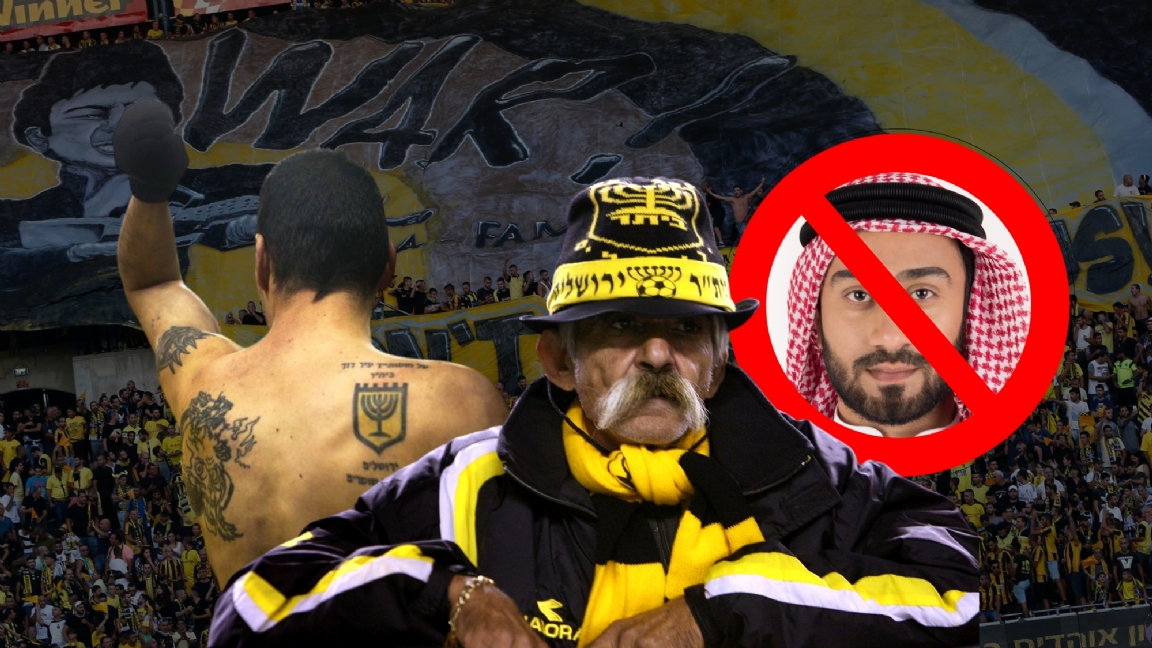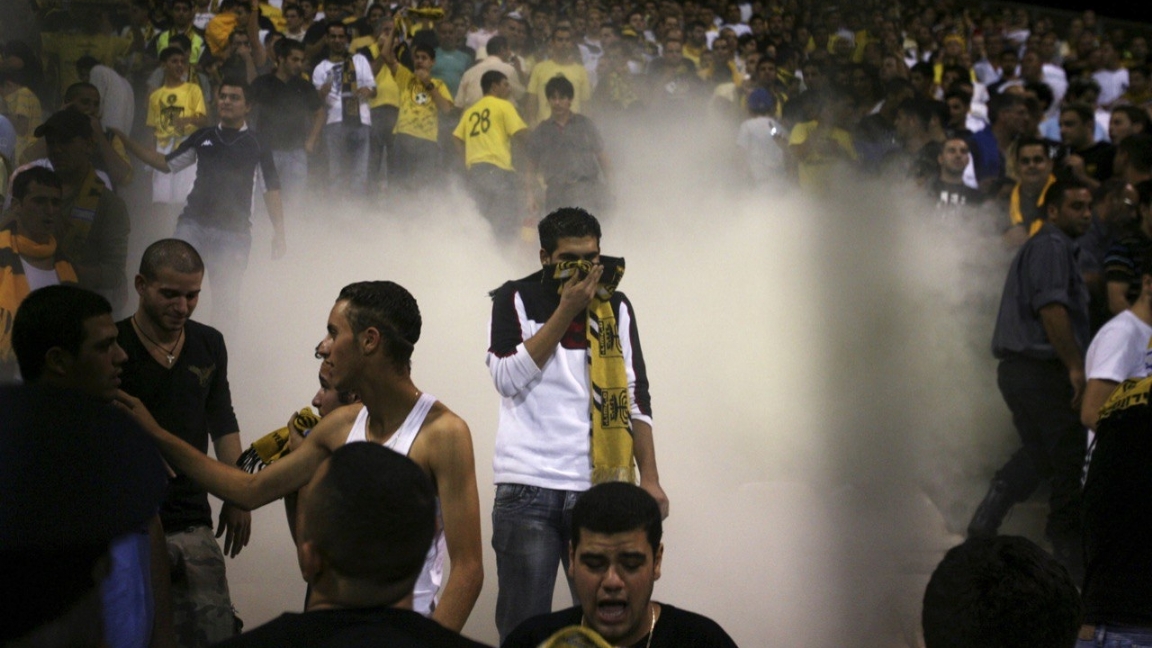![]()


After their missed penalties in the 2021 European Championship final, Jadon Sancho, Marcus Rashford and Bukayo Saka were the focus of a load of racist expressions. Not only in England, but also in Russia, for example, the expressions are often not pretty. Zenit St Petersburg fans were furious with the club management after the purchase of Brazilian Malcom for not upholding the tradition of ‘not attracting players of color’. In the Netherlands, too, after the match between FC Utrecht and Ajax, it was about the monkey noises that the FC Utrecht supporters had made towards Ajax striker Brian Brobbey. However, the most extreme example of racism in football comes from Israel. The hard core of Beitar Jerusalem does not hide its racism. “We are the most racist club in the world,” one banner read.
By: Bart D’Hanis
Beitar Jerusalem was founded in 1936 and is one of the largest clubs in Israel. The club has the most fans in the country and can count on the support of a slew of right-wing politicians, including former Prime Minister Benjamin Netanyahu. The club was founded as a counterpart to the established power, which at the time meant the British Kingdom. Founders Shmuel Kirschstein and David Horn were also both presidents of the Betar branch in Jerusalem. Several team members were also part of the banned militias closely associated with the right-wing revisionist Zionist movement. Since its foundation in 2005, the hard core of the club, La Familia, has been infamous for its anti-Islam, anti-Arabic chants, banners and many acts of violence.

Beitar Jerusalem won its first league title in 1987, followed by five more in 1993, 1997, 1998, 2007 and 2008. These championships resulted in great posters abroad against clubs such as Benfica and Glasgow Rangers. to measure, a lot of money was spent. This often resulted in budget gaps at the end of the year. These gaps were filled by lender Gad Zeevi. When Zeevi wanted to make his daughter director of the club in 2005, the hard core of the club protested violently. Zeevi then decided to turn off the money tap and left Beitar with huge debts.
Arcadi Gaydamek finally saved the Menorah from destruction. He bought the club, but soon afterwards indicated that he had nothing to do with football. He wanted to make himself popular for the mayoral elections of Jerusalem in 2008 by improving the image of the club under his leadership. Abass wanted to get Shuan to Jerusalem. When La Familia got wind of the interest, they displayed banners saying “Suan, you don’t represent us” and “We hate all Arabs”. The purchase ultimately fell through, leaving Beitar Jerusalem the only club in Israel without ever having an Arab player under contract. Beitar’s ultras are proud of this. After the deal was made, banners were displayed reading: “Beitar forever pure.” When Gaydamek received only three percent of the vote for the mayoral elections in 2008, he decided to sell the club.
Gaydamek sold Beitar to American investor Guma Aguiar. However, Aguiar was admitted to a psychiatric hospital a few months after being taken over. In 2012, the new owner mysteriously disappeared after sailing alone in Fort Lauderdale, Florida. His boat and phone were later found. In 2015, two and a half years after his disappearance, he was officially declared dead. Eli Tabib then took over the club in turn and cleared Beitar’s two and a half million euros debt in the first month. Despite this payment, Tabib could not count on very much credit from the supporters. Tabib was previously the owner of Hapoel Tel-Aviv. Hapoel is diametrically opposed to Beitar. The club with the Hammer and Sickle in the logo is known as the left-wing club of Israel.
Tabib’s unpopularity grew when after his takeover he stated that he wanted to eradicate racism and violence. Tabib was so hated by certain supporters that a grenade was placed under his car. A neighbor saw the incident and called the police. After incidents in Belgium during an away game against Charleroi SC, Labib had enough and decided to sell the club. This also went wrong at La Familia, after which they visited him at home and shot him at the front door. A bullet pierced his hand.
2015 was also the year in which Beitar brought two Chechen Muslims to Jerusalem on a rental basis. La Familia was so angry about this that the club had to hire a bodyguard to protect the players. Beitar’s offices were set on fire using Molotov cocktails. When one of the two mercenaries scored a goal for Beitar, a large part of Beitar’s hard core left the stadium.
The two failed attacks on Tabib did not stop crypto and tech entrepreneur Moshe Hogeg from taking over Tabib’s club. Immediately after his takeover, Hogeg announced that a player’s origin and religion would no longer play a role in the transfer policy. He also promised to follow up fans who chanted racist slogans. That seemed to help. In 2018, there were “much fewer reports of racism” than before. The BBC made an item about La Familia that year, claiming that ‘racism had disappeared’. However, nothing turned out to be less true. When Beitar took on the Nigerien Ali Muhammed in 2019, who is not a Muslim but a Christian, he had to officially change his name from La Familia because Muhammed sounded ‘too Muslim-like’. Two years later, in 2021, Hogeg was suspected of 21 crimes. The allegations range from fraud to sexual assault. Hogeg claims to be innocent, yet all his assets were frozen, leaving Beitar with $20 million in debt.
The team management was looking for money to pay the salaries. Some players were released mid-season. All other players and workers had to agree to have their salaries cut by 30 percent. The Menorah took tenth place in the final competition on May 14, 2022. After that, Beitar Jerusalem’s problems got worse. Israeli police deemed Hogeg’s property “money laundering,” including Beitar. In July 2022, the Israeli police received permission from a court to seize all of Hogeg’s property.
Beitar became a hostage. Until August 10, there was a constant threat of Beitar Jerusalem relegated to the second tier over a $12 million debt: a club that can’t pay players’ contracts should not be allowed to play in professional league. Israeli police demanded money from Hogeg and a new intended buyer, Baraq Avramov. After Avramov transferred one and a half million dollars, an elaborate deal was made between Hogeg and Avramov, on which Beitar was sold. After everything was approved on August 11, 2022, Beitar Jerusalem was allowed to start the 2022/23 season in the Israeli Premier League.
